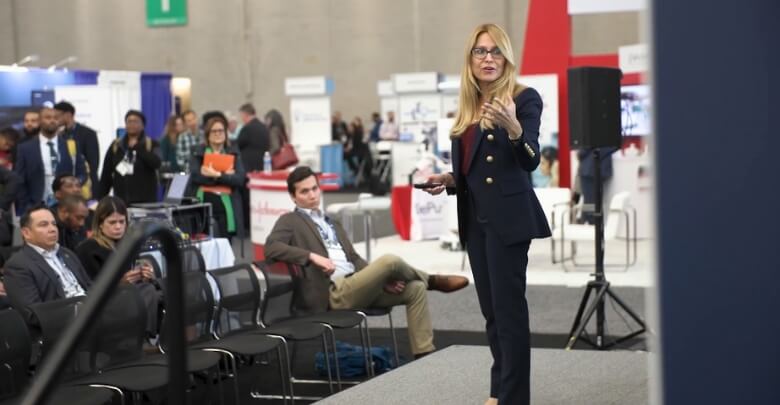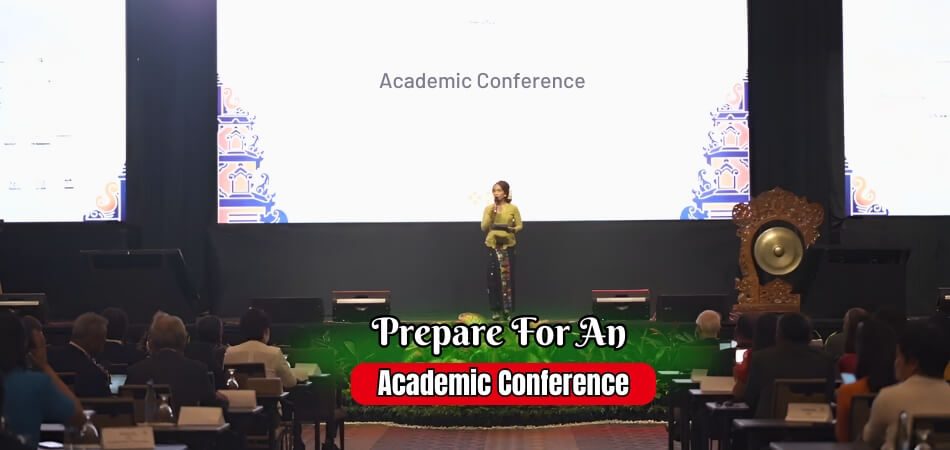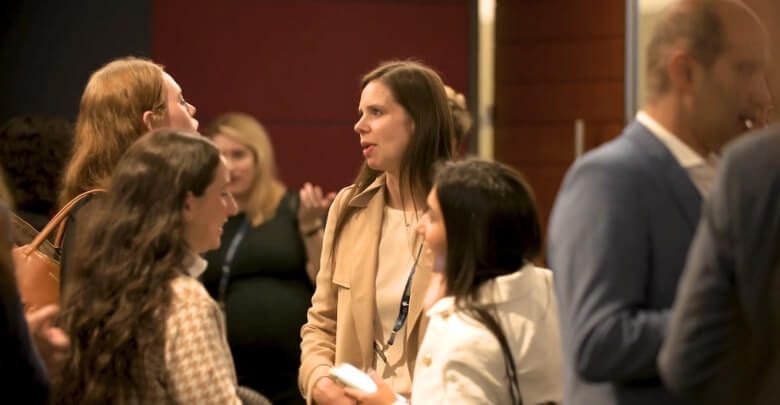The academic conference is an important forum for exchanging knowledge, presenting findings, and networking with researchers, scholars, and professionals in their respective fields. If you plan on participating in an academic conference, you might wonder how to prepare for an academic conference. It’s essential to be strategic and proactive.
You should start by researching suitable events and getting acquainted with the presenters to maximize your learning experience. Networking with attendees before and during the conference can lead to valuable connections. Arrive early to settle in, and carefully balance your schedule to make the most of each session.
Engaging in poster sessions and following up afterward ensures lasting benefits from your participation. Dive into the rest of this article for a detailed guide to effectively preparing for an academic conference.
What the Academic Conference is About?
Academic conferences provide a space for scholars to share research, discuss ideas, and learn new trends. Experts from various fields gather to engage, debate, and explore innovative approaches to real-world issues. For many attendees, these events offer valuable opportunities to gain insight from leading professionals. It’s also an ideal place to discover collaborative partnerships, network with peers, and explore potential avenues for future research projects that can address pressing challenges in their disciplines.

Participants can explore various topics, from science to humanities, all presented by knowledgeable experts. That’s why many participants look for upcoming academic conferences to attend to find inspiration for their work through workshops, presentations, and discussions. Ultimately, this academic event helps individuals stay current and informed within their fields, enhancing both personal and professional growth.
What Happens at An Academic Conference?
Academic conferences are dynamic events where experts share their research, ideas, and innovations. These gatherings provide numerous opportunities for learning and networking. Here’s what typically happens at an academic conference:
- Researchers present their findings in scheduled sessions, offering insights into their latest studies and methodologies.
- Panel discussions feature experts debating current issues and advancements, encouraging lively and informative exchanges.
- Workshops allow participants to develop new skills and gain hands-on experience with cutting-edge techniques.
- Poster sessions showcase individual research projects, facilitating direct interaction between presenters and attendees.
- Networking breaks provide a chance to meet peers, build professional relationships, and discuss collaborative opportunities.
- Keynote speakers deliver inspiring talks on major trends, offering valuable perspectives and future directions.
- Exhibitions display the latest tools, technologies, and publications relevant to the conference theme.
- Social events, like dinners and receptions, help attendees unwind and foster informal connections.
These activities make academic conferences enriching and impactful experiences for all participants. They contribute significantly to personal growth and professional development.
How to Prepare for An Academic Conference?
Academic conferences are valuable opportunities for researchers and professionals to share knowledge, network, and learn. Proper preparation can maximize your experience and ensure you gain the most from these events. Here’s a step-by-step guide to help you get ready for an academic conference.
Step 1: Do Your Research Before Selecting Conferences
Visit websites like the Global Conference to explore different conferences related to your field. Consider factors such as location, theme, and reputation. Choose conferences that align with your research interests and goals.
Step 2: Get Familiar With the Presenters
Review the conference program to identify keynote speakers and session presenters. Familiarize yourself with their backgrounds and areas of expertise, as this will help you engage more meaningfully during discussions and ask relevant questions that demonstrate your interest in their work.
Step 3: Get to Know Other Attendees
Attend networking events, workshops, and social gatherings to meet fellow researchers, professors, and industry professionals. Introduce yourself and exchange contact information for future collaboration. Building connections can lead to valuable partnerships.
Step 4: Arrive Early
Arriving early helps you settle in, find your way around, and avoid last-minute stress. Use the extra time to connect with other early arrivals. This ensures you start the conference on a relaxed note.
Step 5: Balance Your Day
Plan your schedule to include a mix of sessions, workshops, and breaks. Prioritize sessions that are most relevant to your research. Taking breaks will help you recharge and provide more opportunities for networking.
Step 6: Follow Up
After the conference, follow up with the people you met by sending thank-you emails and connecting on professional platforms. Discuss potential collaborations and reflect on what you learned. This step solidifies the relationships and knowledge gained during the event.
Step 7: Don’t Miss the Poster Sessions
Poster sessions provide a chance to engage with researchers and learn about their work. Visit different posters, ask questions, and exchange ideas. These interactions can offer unique insights and connections.
Preparing thoroughly for an academic conference can greatly enhance your experience, making it more productive and enjoyable. Embrace the opportunity to learn, network, and share your knowledge. Enjoy the experience and make the most out of every moment.
The Benefits of Being Well-Prepared for Academic Conferences
Being well-prepared for academic conferences can significantly enhance your experience and professional growth. Thoughtful preparation ensures you make the most of the opportunities these events offer. Here are the top five benefits of being well-prepared for academic conferences.
Maximizing Learning Opportunities
When well-prepared, you can focus on sessions that align with your interests and research. This allows you to gain deeper insights into the latest advancements in your field. Prioritizing relevant presentations ensures you absorb valuable information that enhances your work.
Engaging with the material presented becomes easier when you have a clear understanding of the topics. This preparation allows you to participate actively in discussions. By knowing what to expect, you can prepare questions and topics for deeper exploration.
Strengthening Your Networking Potential
Preparation helps you identify key individuals to connect with during the conference. By researching attendees and presenters beforehand, you can plan meaningful interactions. This leads to valuable professional relationships and potential collaborations.
Knowing who will be present allows you to target specific people for networking. You can prepare conversation starters and questions personalized to their work. This thoughtful approach makes your networking efforts more effective and memorable.
Enhancing Confidence and Reducing Stress
Arriving well-prepared minimizes last-minute anxiety and stress. Familiarizing yourself with the schedule and venue allows for a smoother experience. This enhances your confidence and helps you engage more actively in the event.
Confidence in your preparation translates into more meaningful participation. You can review your presentation materials if you have submitted your paper following the steps to submit a paper to an academic conference.
Improving Engagement and Participation
Preparation enables you to ask thoughtful questions and contribute to discussions. This active participation enhances your visibility and reputation among peers. Engaging effectively with others fosters a more enriching conference experience.
When you are well-prepared, you can connect the dots between different presentations and topics. This interconnected understanding allows for deeper engagement in discussions. Your contributions become more insightful and impactful.
Facilitating Post-Conference Follow-Ups
A well-prepared attendee is more likely to make lasting connections and follow up effectively. Gathering contact information and notes during the conference helps in maintaining relationships. This leads to fruitful collaborations and continued professional growth.
Effective follow-up begins with good preparation during the event. By noting key points and contacts, you can craft meaningful follow-up messages. This ongoing communication solidifies the connections made and opens doors for future opportunities.
How Do You Utilize the Learnings from Academic Conference to Your Benefits?
Gaining fresh insights and growing professionally is a powerful outcome of attending an academic conference. However, making the most of these learnings takes intentionality and planning. Here’s how to maximize what you gained to truly benefit your work and personal growth:
- Immediate Implementation: Apply fresh strategies and insights to ongoing projects to see real-time results and improvements.
- Networking Follow-Up: Strengthen new connections by continuing discussions post-conference, opening doors for future collaborations.
- Share Knowledge: Host a session or write a summary to share key learnings with colleagues who missed the event.
- Review and Reflect: Periodically review your conference notes and think about how the new knowledge benefits your projects.
- Incorporate Feedback: Use the critique received during your presentation to refine your methods and approaches effectively.
- Stay Updated: Keep an eye on follow-up publications or posts from the conference to maintain a grip on evolving dialogues.
- Plan Future Research: Spot new research opportunities highlighted at the conference and sketch out plans for exploring these areas.
- Expand Your Skillset: Integrate new skills or techniques into your daily workflow to enhance your professional capabilities.
Using these steps ensures that the impact of attending an academic conference goes beyond just a few days of learning. By considering various reasons to attend academic conferences, you open doors to deeper insights and valuable networking. By actively applying and reflecting on new knowledge, you can enhance both your personal and professional growth.
FAQs About How To Prepare for An Academic Conference?
Preparing for an academic conference can seem a complex process, but with the right guidance, you can make the most of the experience. Here are some frequently asked questions to help you prepare effectively:
What Should I Do Before Selecting a Conference?
Research different conferences related to your field, considering factors like location, theme, and reputation. Choose events that align with your research interests and goals to ensure you gain the most relevant insights.
How Can I Familiarize Myself with The Presenters?
Review the conference program to identify keynote speakers and session presenters. Read their work or watch their previous talks to prepare questions or discussion points for their sessions, enhancing your engagement and learning experience.
What’s the Best Way to Network at A Conference?
Attend networking events, workshops, and social gatherings. Introduce yourself to fellow researchers, professors, and industry professionals. Exchange contact information for future collaboration and follow up with new contacts after the conference to maintain these connections.
Why Is It Important to Arrive Early at The Conference?
Arriving early allows you to settle in, find your way around, and avoid last-minute stress. Use the extra time to connect with other early arrivals, making a positive and relaxed start to your conference experience.
How Should I Balance My Conference Schedule?
Plan your schedule to include a mix of sessions, workshops, and breaks. Prioritize sessions that are most relevant to your research and take breaks to recharge, ensuring you can actively participate and engage throughout the event.
How Do I Follow up After a Conference?
After the conference, follow up with people you met by sending thank-you emails and connecting on professional platforms. Discuss potential collaborations and reflect on what you learned to solidify relationships and enhance your professional growth.
What Are the Benefits of Attending Poster Sessions?
Poster sessions provide a chance to engage with researchers and learn about their work in detail. Visit different posters, ask questions, and exchange ideas, which can offer unique insights and foster valuable professional connections.
How Can I Prepare for Engaging with Speakers and Attendees?
Prepare by researching their work and identifying common interests or questions. This preparation allows for more meaningful and informed conversations, helping you build stronger connections and gain deeper insights from interactions at the conference.
Endnotes
There are countless opportunities for professional growth, education, and networking at academic conferences. By understanding how to prepare for an academic conference, you can maximize these benefits and ensure a successful experience.
Thoughtful preparation allows you to engage deeply with the content, connect meaningfully with your peers, and showcase your work effectively. Remember to research events thoroughly, familiarize yourself with presenters, and plan your schedule strategically.
Following up with contacts and reflecting on what you’ve learned are crucial steps for ongoing professional development. By adapting to these strategies to make the most of every academic conference you attend, enhancing your knowledge and career prospects.







